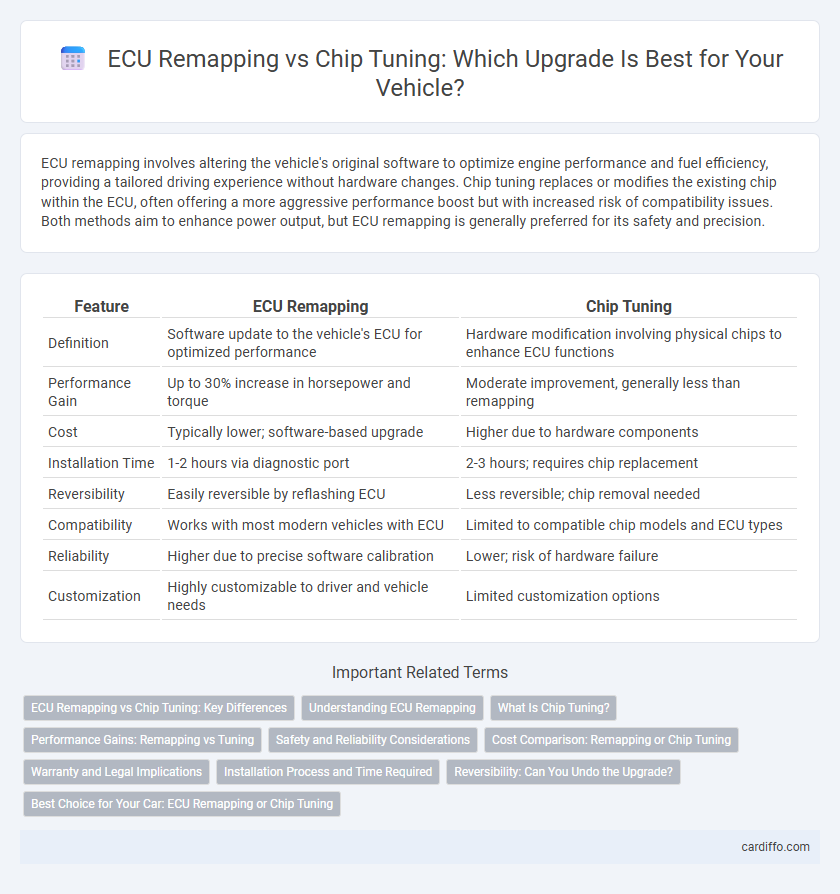ECU remapping involves altering the vehicle's original software to optimize engine performance and fuel efficiency, providing a tailored driving experience without hardware changes. Chip tuning replaces or modifies the existing chip within the ECU, often offering a more aggressive performance boost but with increased risk of compatibility issues. Both methods aim to enhance power output, but ECU remapping is generally preferred for its safety and precision.
Table of Comparison
| Feature | ECU Remapping | Chip Tuning |
|---|---|---|
| Definition | Software update to the vehicle's ECU for optimized performance | Hardware modification involving physical chips to enhance ECU functions |
| Performance Gain | Up to 30% increase in horsepower and torque | Moderate improvement, generally less than remapping |
| Cost | Typically lower; software-based upgrade | Higher due to hardware components |
| Installation Time | 1-2 hours via diagnostic port | 2-3 hours; requires chip replacement |
| Reversibility | Easily reversible by reflashing ECU | Less reversible; chip removal needed |
| Compatibility | Works with most modern vehicles with ECU | Limited to compatible chip models and ECU types |
| Reliability | Higher due to precise software calibration | Lower; risk of hardware failure |
| Customization | Highly customizable to driver and vehicle needs | Limited customization options |
ECU Remapping vs Chip Tuning: Key Differences
ECU remapping involves altering the vehicle's software to optimize engine performance by adjusting parameters such as fuel injection, ignition timing, and boost pressure, resulting in improved horsepower and fuel efficiency. Chip tuning, on the other hand, entails replacing or modifying the physical chip inside the ECU to achieve similar enhancements but with less precision and flexibility compared to remapping. Key differences lie in the method of modification--software versus hardware--where ECU remapping offers customizable and reversible changes, whereas chip tuning often provides fixed, less adaptable performance upgrades.
Understanding ECU Remapping
ECU remapping involves modifying the software within the engine control unit to optimize fuel injection, ignition timing, and boost pressure, resulting in improved engine performance and efficiency. Unlike chip tuning, which replaces the physical chip, ECU remapping rewrites the existing data to tailor the vehicle's parameters without hardware changes. This process enhances power output, torque, and fuel economy while maintaining the vehicle's original hardware integrity.
What Is Chip Tuning?
Chip tuning involves modifying the software stored on a vehicle's engine control unit (ECU) to optimize performance, fuel efficiency, or emissions. Unlike ECU remapping, which rewrites the entire software, chip tuning focuses on replacing or reprogramming the physical chip containing the ECU data. This method allows for precise adjustments to engine parameters such as fuel injection, ignition timing, and boost pressure, enhancing power output and drivability without extensive hardware changes.
Performance Gains: Remapping vs Tuning
ECU remapping optimizes the engine control unit by adjusting fuel injection, ignition timing, and boost pressure, resulting in smoother performance gains and improved fuel efficiency. Chip tuning involves replacing or reprogramming the physical chip, offering more aggressive power increases but potentially higher risk of engine strain. Performance gains from ECU remapping typically provide balanced improvements, whereas chip tuning aims for maximum power output often favored in high-performance applications.
Safety and Reliability Considerations
ECU remapping modifies the vehicle's software to enhance performance without altering hardware components, preserving factory safety protocols and system integrity. Chip tuning involves replacing or adding hardware chips, which may increase risk of system incompatibilities or hardware wear, potentially compromising reliability. Prioritizing ECU remapping ensures safer tuning outcomes by maintaining original electronic safeguards and reducing the likelihood of mechanical failures.
Cost Comparison: Remapping or Chip Tuning
ECU remapping typically costs between $300 and $700, offering a cost-effective way to optimize engine performance by adjusting software settings. Chip tuning involves physically replacing or modifying the chip within the ECU, often ranging from $400 to $1,200, making it a pricier option with potentially more permanent changes. Comparing costs, remapping generally presents a more affordable and reversible upgrade compared to the higher investment and complexity of chip tuning.
Warranty and Legal Implications
ECU remapping typically involves software adjustments within the vehicle's existing control unit, preserving the original hardware and often maintaining manufacturer warranty coverage if performed by authorized dealers. Chip tuning requires replacing or modifying the physical chip, which can void warranties and may have stricter legal implications depending on regional regulations. Understanding the extent of warranty protection and compliance with local laws is essential to avoid penalties and ensure long-term vehicle reliability.
Installation Process and Time Required
ECU remapping involves directly reprogramming the vehicle's Engine Control Unit software through a diagnostic port, typically completed within 30 to 90 minutes without requiring hardware modifications. Chip tuning requires physically removing the ECU or plugging in an external chip, which can extend the installation time to 1-2 hours depending on the vehicle model. The remapping process is generally quicker and less invasive, offering a streamlined upgrade with minimal downtime.
Reversibility: Can You Undo the Upgrade?
ECU remapping offers full reversibility by restoring the original software configuration, allowing users to undo performance upgrades without permanent changes. Chip tuning involves physically altering or replacing chips, making reversal more complex and sometimes risking hardware damage. Choosing ECU remapping ensures a safer, fully reversible upgrade with preserved factory settings.
Best Choice for Your Car: ECU Remapping or Chip Tuning
ECU remapping optimizes engine performance by modifying software parameters, resulting in improved fuel efficiency and power output without hardware changes. Chip tuning involves replacing or modifying the physical chip in the ECU, offering similar benefits but with a higher risk of hardware compatibility issues. For most vehicles, ECU remapping is the best choice due to its precision, reversibility, and compatibility with modern engine management systems.
ECU remapping vs chip tuning Infographic

 cardiffo.com
cardiffo.com